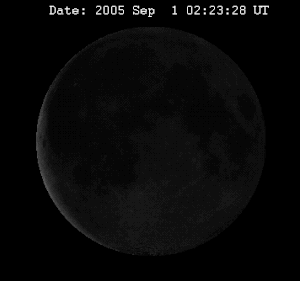 WikipediaGet ready for a close encounter with the moon. On March 19, the moon won't just be at its closest approach to Earth in its elliptical orbit, but enthusiasts say it will be closer to Earth than it's been in 18 years. The moon's orbit around us is slightly elliptical, and when the moon is at the near point it is known as a lunar perigee. But on the Internet, astronomy and astrology fans are calling this upcoming lunar event a "supermoon."
WikipediaGet ready for a close encounter with the moon. On March 19, the moon won't just be at its closest approach to Earth in its elliptical orbit, but enthusiasts say it will be closer to Earth than it's been in 18 years. The moon's orbit around us is slightly elliptical, and when the moon is at the near point it is known as a lunar perigee. But on the Internet, astronomy and astrology fans are calling this upcoming lunar event a "supermoon."For the past few days, they've not only been buzzing about the mega moon, but the meteorological mayhem they expect it to cause. But no need to grab your survival kit just yet -- scientists say it just isn't so.
In a blog post earlier this month, AccuWeather blogger Mark Paquette said a new or full moon at 90 percent or more of its closest perigee qualifies as a "supermoon." Next weekend's full moon won't just be a supermoon but an extreme supermoon, he said, because the moon will be almost precisely at its closest distance to Earth.
According to "new age" forecasts, he said, the supermoon is expected to bring strong earthquakes, storms or unusual climate patterns.
"There were supermoons in 1955, 1974, 1992 and 2005. These years had their share of extreme weather and other natural events. Is the Super Moon and these natural occurrences a coincidence?" he wrote. "Some would say yes; some would say no. I'm not here to pick sides and say I'm a believer or non-believer in subjects like this, but as a scientist I know enough to ask questions and try to find answers."
Paquette told ABCNews that he wants to remain "neutral" on the topic but said, "I do think it's possible that it could bring earthquakes, volcanic eruptions or anything weather-related as well."
But NASA astronomer Dave Williams said there's no reason to believe that anything out of the ordinary -- aside from an especially big and bright full moon -- will take place next week.
"There's nothing really special about this," he said.
For starters, although the moon will be closer than it's been for 18 or 19 years, it will only be one or two percent closer.
"It's nothing you could notice unless you made really accurate measurements," he said. "It's a few thousand miles closer, but as far as the moon's orbit is considered, that's nothing."
Comstock/Thinkstock(NEW YORK) -- Copyright 2011 ABC News Radio
